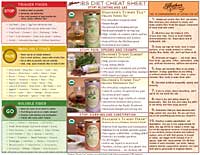Ginger
The use of ginger dates back to ancient India, China, and Japan, where it's been cultivated for thousands of years. Ginger was sold to the ancient Greeks and Romans by Arabian traders, the Spaniards brought it to America, and it's now grown in the West Indies. Chinese herbalists have been recommending ginger for more than 2,500 years, and it plays an important role in traditional healing in cultures around the world.Ginger is helpful for a wide variety of gastrointestinal ailments ranging from simple indigestion to severe nausea and cramps. Numerous clinical studies have documented that it provides effective relief for morning sickness and post chemotherapy nausea, and it has been shown to be more effective for preventing motion sickness than the drug Dramamine.
If you've overeaten at a meal ginger is particularly helpful, as it contains very powerful digestive enzymes. It can also increase your appetite before a meal.
Ginger is available in many different forms, and they're all highly effective for IBS. Fresh gingerroot is available in the produce section of supermarkets, and the root is also available dried in the bulk section of most health food stores. Both fresh and dried gingerroot can be brewed into teas, and roughly chopping or grating the fresh root will increase the strength of the brew (don't bother peeling the root first). Simply strain out the root when the tea has reached its desired stength. Ginger tea is particularly tasty with a little honey added, though it's not necessary to sweeten it.
Crystallized ginger slices taste like candy, and can be chewed and eaten between or after meals for a deliciously helpful way to prevent IBS symptoms. Ginger Altoids are also beneficial, and can be chewed as often as desired to relieve nausea and other forms of digestive distress.
Learn more about herbs for IBS.
|
 Excerpted from Eating for IBS. |
